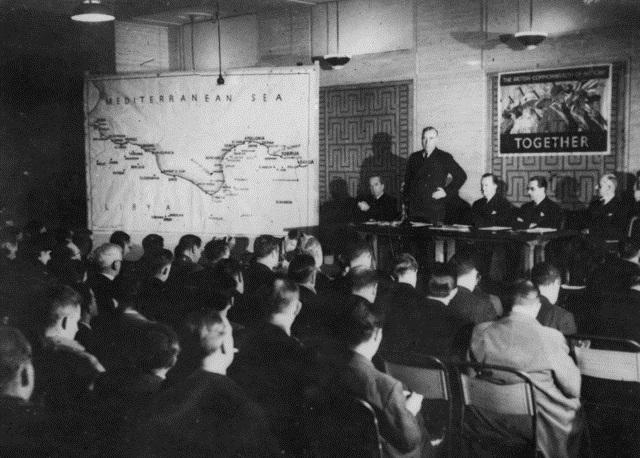The foreign and defence policies of Robert Menzies: 50 years on
Posted By Peter Edwards on January 28, 2016 @ 14:52
Fifty years ago this month Robert Menzies retired from Parliament, after a record-breaking 16 years as Prime Minister (in addition to an earlier term of just over two years in 1939–41) and having won seven successive elections.
How do his foreign and defence policies look after half a century? His critics always alleged that he was too deferential to Britain and the US, the allies whom he famously described as our ‘great and powerful friends’. They point to Suez [2] and Vietnam [3] as the most blatant examples. His supporters, most notably John Howard, see Menzies as the sage statesman, who steered a prudent course through the challenges of the Cold War and decolonisation, and whose counsel was valued by the leaders of nations small and large.
The truth lies somewhere between. For a start, it’s a mistake to assume his performance was entirely consistent over those 16 years. The Menzies of the early 1950s, still in his own fifties, was in many respects creative and innovative; the septuagenarian of the mid-1960s could be rigid and dogmatic, too often inclined to rely on policies that had been successful but had passed their use-by date.
In a paper I wrote for ASPI last year [4] (PDF) I argued that ‘forward defence’, the key strategic concept of the Menzies era, was essentially sound, as long as it was applied astutely. Much depended on the statecraft with which it was applied. The contrast, for example, of the government’s handling of the twin crises in Indonesia and Vietnam in the early 1960s illustrate both the strengths and the weaknesses of the Menzies government’s foreign policy performance more generally.
In the case of Confrontation, for example, Menzies and his ministers didn’t simply respond to British pressures, but repeatedly challenged London’s political and military strategies. Their response to requests for military intervention, especially for boots on the ground, was cautious, and balanced by vigorous and independent diplomacy in Asian capitals.
On Vietnam, by contrast, Menzies and his closest advisers relied uncritically on American power and judgement. They pressed Australian troops on to the Americans, when Washington policymakers had no clear strategy and had only indicated a vague request for more advisers.
In the case of Confrontation, policy was made by vigorous argument within and between the key departments (External Affairs, Defence and Prime Minister’s) and their respective ministers. In the case of Vietnam, Menzies sidelined many who advised caution and relied heavily on advisers who shared his assumptions.
Those and other contrasts were typical of the whole period. Menzies appointed leading ministers to External Affairs (as Foreign Affairs was known until 1970). When he listened to their advice, debated policy options with them, and gave them a significant degree of freedom in the pursuit of an agreed goal, the policies were often successful. The creation of ANZUS, the establishment of the Colombo Plan, the negotiation of the Australia–Japan Commerce Agreement, and the skilful handling of the Indonesian Confrontation are all testaments to this approach. But when Menzies overruled them or disregarded their counsel, as he did over Suez and Vietnam, the results were usually less positive. One of the least successful periods of the whole era was the two years, 1960–61, when Menzies was his own Minister for External Affairs.
A significant legacy of the Menzies era was the development of policymaking departments. Menzies supported the growth in size and professionalism of the Department of External Affairs even though the young diplomats were generally inclined to put more emphasis on Asian relationships and less on ‘great and powerful friends’ than their Prime Minister. By the end of Menzies’s term, Australia had a much more professional foreign office and diplomatic service.
But Menzies didn’t grasp the nettle of reform to Defence. In 1949 he inherited a cumbersome defence structure created for the 1939–45 war, which institutionalised inter-service rivalry and was ill-equipped to give advice on strategic policy. Menzies established a high-level committee, but failed to implement most of the major changes it recommended. Substantial Defence reform would have to wait until the 1970s.
Menzies based his defence policies on the closest possible relations with Britain and the US, but didn’t simply defer to their wishes. British and American leaders were often at odds, especially in Southeast Asia. Menzies sometimes tried to mediate between the two great powers; at other times he would try to use one ally to influence the other towards Australia’s preferred position.
Menzies’s highly public adulation of the monarchy, the Empire-Commonwealth and other British institutions didn’t translate, as his critics often assumed, into uncritical subservience to policymakers in Whitehall and Westminster. In Menzies’s mind, it was Britain, not Australia, that had turned away from the traditional relationship. The most obvious demonstration was Britain’s first attempt to enter what was then called the European Common Market, with severe implications for Australian security as well as trade.
Although Menzies, born in Queen Victoria’s reign, was clearly more comfortable in London or Washington than in Asian capitals, he wasn’t simply a racist anti-Asian. His visceral antipathy toward India’s Jawaharlal Nehru was based on fundamental political differences, but he established good relations with like-minded Asian leaders, such as Singapore’s Lee Kuan Yew and Malaysia’s Tunku Abdul Rahman.
Menzies’s record in foreign and defence policy wasn’t flawless, but he did more than his critics would allow in ensuring that Australia adjusted to a world very different from that of his youth.
Article printed from The Strategist: https://aspistrategist.ru
URL to article: /the-foreign-and-defence-policies-of-robert-menzies-50-years-on/
URLs in this post:
[1] Image: https://aspistrategist.ru/wp-content/uploads/2016/01/006413.jpg
[2] Suez: http://www.abc.net.au/radionational/programs/backgroundbriefing/the-suez-crisis-1956/3347918
[3] Vietnam: https://theconversation.com/fifty-years-ago-today-menzies-call-on-vietnam-changed-australias-course-40590
[4] a paper I wrote for ASPI last year: https://www.aspistrategist.ru/publications/learning-from-history-some-strategic-lessons-from-the-forward-defence-era/Learning_from_history.pdf
Click here to print.
